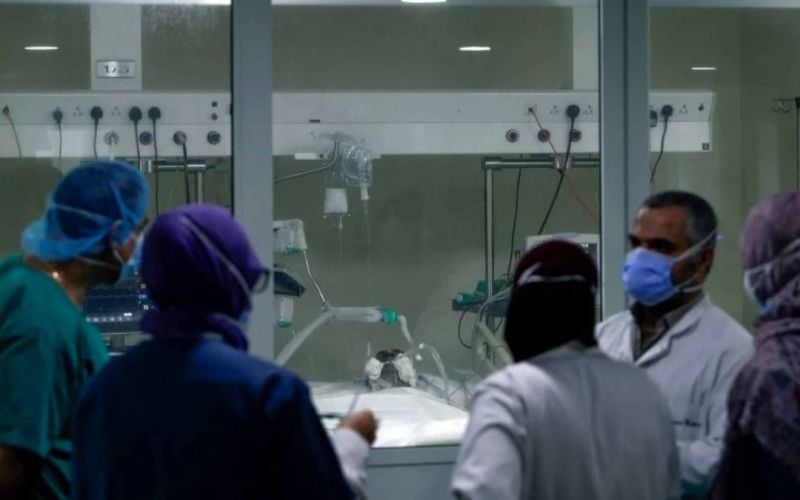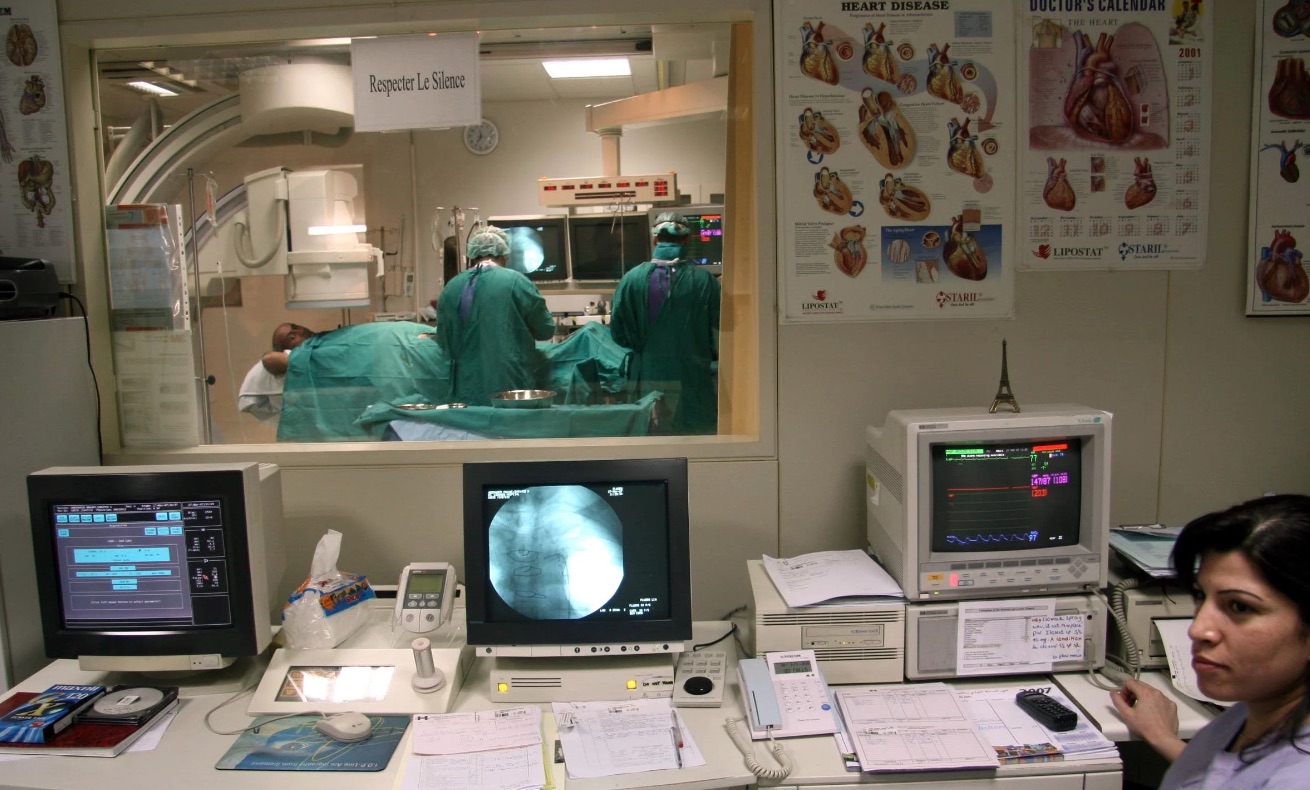
Most of the brain drain took place in 2020 and 2021, years marked by the economic crisis and Covid-19. (Credit: Joseph Eid/AFP archives)
Drs. Maria Nasr, a psychiatrist, and Peter Ghiya, a urologist, will soon return to Lebanon, after spending almost a year and a half in Pontoise, France. The young couple moved to France after graduating at the height of the economic crisis, which began in autumn 2019.
“It had become difficult to live [in Lebanon],” recalled Dr. Nasr. Emigration offered them the prospect of a more stable life and rewarding professional experience. “In France, my husband received training in very specialized techniques, such as robotics,” Nasr said.
Like this young couple, many doctors left the country in 2020 and 2021. The economic collapse, and the devaluation of the lira, which reduced their salaries and fees to nothing, and the uncertainty about the future, particularly after the Beirut port explosion on Aug. 4, 2020, prompted these physicians to leave the country.
According to the World Health Organization (WHO), nearly 40 percent of doctors and 30 percent of nurses left Lebanon permanently or temporarily during this period. Destinations remained more or less the same: Europe, the United States, Canada, and Arabian Gulf countries.
While the reasons behind the mass exodus of doctors may seem obvious, the reasons some of them returned may be surprising. According to Dr. Nasr, and many other doctors of all ages, emigration did not turn out to be the El Dorado they had hoped for — especially amid global inflation and administrative complications. The young psychiatrist recounted the long and difficult path toward becoming an established doctor in France.
“We’re not well paid as foreign doctors, especially given current inflation. We weighed up the pros and cons and decided to return to Lebanon,” she said.
There is another factor that is driving Lebanese doctors back. The system in Lebanon has somewhat adapted to the crisis, and doctors’ salaries and wages are now paid in fresh dollars, which ensures an acceptable standard of living once again.
 (Credit: L'Orient-le Jour archives)
(Credit: L'Orient-le Jour archives)
One young neurologist, who declined to be named and who had a very interesting two-year professional experience in France, returned to open a clinic in Lebanon. “Now that living conditions have improved, I prefer to practice medicine in my own country,” she said
It was not financial or professional insecurity that prompted Dr. Bahige Arida, 60, an obstetric gynecologist, who returned from the US, where he spent two years, and where he studied before moving to Lebanon in 1995.
“During the crisis, I practiced in a small town in Pennsylvania, where two of my colleagues and friends live,” he said.
He said the experience proved exhausting, with endless on-call hours and a population at high risk for health complications. “When I decided to return, many people thought I was crazy because my situation there offered more stability. But my career is behind me, and money isn’t everything,” he said.
A third return?
Whatever the reason that pushed doctors to leave or return, it remains difficult to measure the extent of this phenomenon. Some of those interviewed felt that there has been a real wave of returns.
Others, such as Sleiman Haroun, president of the private hospitals’ union, describe it as “timid.”
According to estimates by the Order of Physicians, nearly 1,000 of the around 3,000 doctors who left during the crisis returned. Dr. George Ghanem, director of the LAU Medical Center-Rizk Hospital, and Dr. Youssef Bakhache, head of the Lebanese Order of Physicians, provided these figures to L’Orient-Le Jour.
Bakhache, who is currently in Europe, called on MDs last Tuesday to “return home and work to develop the Lebanese medical sector.” These remarks were made during a meeting with more than 50 young Lebanese doctors who passed the medical entrance exam in France.
To get a better idea of this phenomenon, a look at the university hospitals needs to be taken. Dr. Georges Dabar, medical director at Hôtel-Dieu de France, reported that 35 of the hospital’s 200 or so doctors left the country during the crisis in 2020 and 2021.
“We had managed to stem the hemorrhage by the summer of 2021, by creating a social safety net for practitioners,” he said.
Today, 12 of these 35 doctors returned, and this wave has been underway since 2022. “In some countries, they were not paid enough, and in others, such as the Gulf States, they felt that they were second-class doctors compared to the locals. Those who have left for the US, on the other hand, have not returned.”
Dr. George Ghanem, director of the LAU-Rizk hospital, said the establishment has suffered less departure than others, having lost around 10 percent of its practitioners, nearly half of whom have returned mainly from Europe or the Gulf States. “We had adjusted salaries and fees in fresh dollars very early on,” Ghanem said.
Reduced ability to attract new specialists
Admittedly, economic and financial considerations played a major role in decisions to leave or return, but they are far from the only factors. There is an undeniable human and personal factor present in choosing to return to a country that has recently experienced trauma and remains unstable.
Dr. Arida said he is “happier” in Lebanon, and underscored the importance of the family unit. Dr. Caroline Abou Zeid, a young pulmonary resuscitation specialist who returned to Lebanon after a year in France, said that she has not really adapted to the routine of working in Europe, and decided simply to return to her family life.
For Dr. Amine Haddad, a renowned otolaryngologist specializing in oncology, it wasn’t the economic aspect that prompted him to quit a few years ago. “I was suffering from the situation in the medical sector, with medicines nowhere to be found, shortages of supplies in the operating department, and a tendency to put profit before patients’ health. I could no longer practice quality medicine.”
The hospitalization of a close relative who needed his care prompted him to return to practice in Lebanon on an intermittent basis. But Haddad continues to have a mixed view towards the country. “People say things are better, that there has been an adjustment to the crisis. But that doesn’t apply to everyone. These days, only those who can afford it or who have insurance in fresh dollars can get treatment.”
The country’s instability remains a major obstacle. Both Dr. Dabar and Dr. Ghanem believe that the problem is not simply a question of doctors leaving and returning. They pointed to Lebanon’s reduced capacity to attract new specialists during the crisis.
“For the time being, we’re managing to maintain cutting-edge medicine, but if we carry on like this, we risk falling behind in five years’ time, because this field is developing very rapidly around the world,” said Dr. Ghanem.
This article was originally published in French in L'Orient-Le Jour. Translation by Joelle El Khoury.